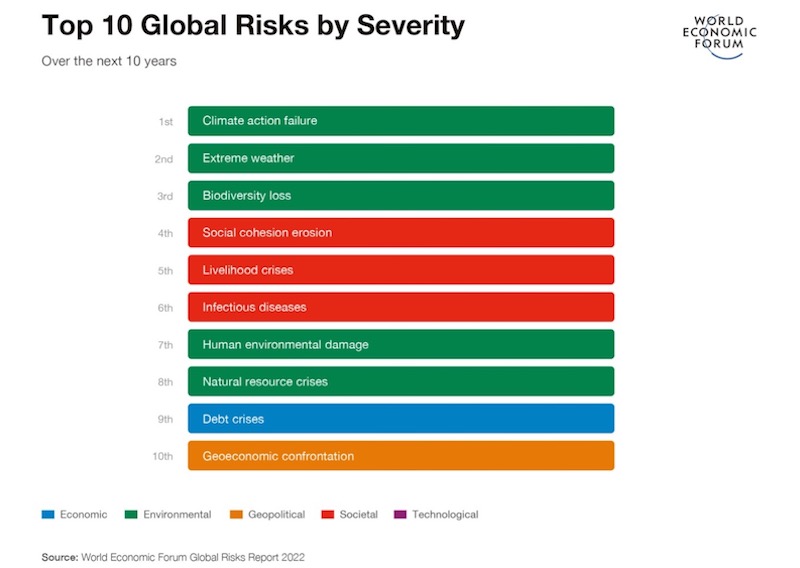Climate failure and social crisis top global risks in 2022
January 2022: Top risks include the climate crisis, growing social divides, heightened cyber risks and an uneven global recovery as the pandemic lingers on, according to the World Economic Forum’s latest Global Risks Report 2022

Climate risks dominate global concerns as the world enters the third year of the pandemic.
According to the Global Risks Report 2022, while the top long-term risks relate to climate, the top shorter-term global concerns include societal divides, livelihood crises and mental health deterioration.
Additionally, most experts believe a global economic recovery will be volatile and uneven over the next three years.
Now in its 17th edition, the report encourages leaders to think outside the quarterly reporting cycle and create policies that manage risks and shape the agenda for the coming years. It explores four areas of emerging risk: Cybersecurity; competition in space; a disorderly climate transition; and migration pressures, each requiring global co-ordination for successful management.
“Health and economic disruptions are compounding social cleavages. This is creating tensions at a time when collaboration within societies and among the international community will be fundamental to ensure a more even and rapid global recovery. Global leaders must come together and adopt a co-ordinated multistakeholder approach to tackle unrelenting global challenges and build resilience ahead of the next crisis,” says Saadia Zahidi, Managing Director, World Economic Forum.
Carolina Klint, Risk Management Leader, Continental Europe, Marsh, says: “As companies recover from the pandemic, they are rightly sharpening their focus on organisational resilience and ESG credentials. With cyber threats now growing faster than our ability to eradicate them permanently, it is clear that neither resilience nor governance are possible without credible and sophisticated cyber risk management plans. Similarly, organisations need to start understanding their space risks, particularly the risk to satellites on which we have become increasingly reliant, given the rise in geopolitical ambitions and tensions.”
Peter Giger, Group Chief Risk Officer, Zurich Insurance Group, says: “The climate crisis remains the biggest long-term threat facing humanity. Failure to act on climate change could shrink global GDP by one-sixth and the commitments taken at COP26 are still not enough to achieve the 1.5 C goal. It is not too late for governments and businesses to act on the risks they face and to drive an innovative, determined and inclusive transition that protects economies and people.”
The report closes with reflections on year two of the Covid-19 pandemic, yielding fresh insights on national-level resilience. The chapter also draws on the World Economic Forum’s communities of risk experts – the Chief Risk Officers Community and Global Future Council on Frontier Risks – to offer practical advice for implementing resilience for organisations.
About the Davos Agenda – the state of the world in 2022
The Global Risks Report 2022 comes ahead of the Davos Agenda, which will mobilise heads of state and government, business leaders, international organisations and civil society to share their outlook, insights and plans relating to the most urgent global issues. The meeting will provide a platform for connection, enabling the public to watch and interact through livestreamed sessions, social media polling and virtual connections.
Read more about the Global Risks Report 2022 here
Thumbnail: Nikita Kuzmenkov/Adobe Stock